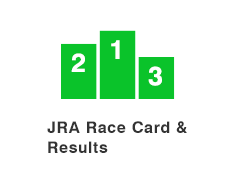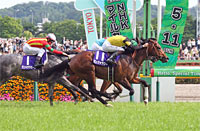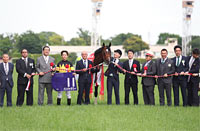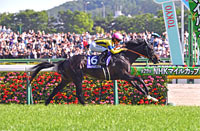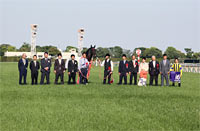NHK Mile Cup (G1) - Data Analysis
Every chance of an upset in this summit contest for 3yo milers
In its early days, the NHK Mile Cup was dominated by foreign-bred horses, in terms of both entrants and results. But things have gradually changed then – in fact, every winner since 2002 has been bred in Japan. Another notable feature in recent years is the frequency of upsets. In 2007, the winner was the 17th favorite Pink Cameo and the 18th favorite finished 3rd, producing a massive Trifecta payout of 9,739,870 yen. In 2009, again, the winner was the 10th favorite, the 13th favorite finished 3rd, and Trifecta bets paid out more than 2 million yen, while in 2013 the 10th favorite won and the Trifecta payout was in excess of 1 million yen. For that alone, this race demands particular care when checking trends based on past data.
Check trends in terms of favoritism
In aggregate performances based on favoritism over the last 10 years, the 1st favorite has produced excellent results including six wins. However, no horse backed as 2nd favorite has won this race in that time, and the 3rd favorite only once; on the other hand, three of the winners have started the race as 10th favorite or lower. As these facts suggest, the outcome tends to be unpredictable if the 1st favorite fails to deliver. Another notable statistic is that seven of the 10 runners-up were backed by single-digit win odds, while conversely, seven of the 10 3rd-placed horses had win odds of 20 or more. [Table 1] [Table 2]
[Table 1] Performance by favoritism (last 10 years)
| Favoritism |
Performance
[1st-2nd-3rd-4th or lower] |
Win ratio |
Top 2 ratio |
Top 3 ratio |
| 1st favorite |
6-1-0-3 |
60.0% |
70.0% |
70.0% |
| 2nd favorite |
0-2-1-7 |
0% |
20.0% |
30.0% |
| 3rd favorite |
1-2-1-6 |
10.0% |
30.0% |
40.0% |
| 4th, 5th favorite |
0-3-1-16 |
0% |
15.0% |
20.0% |
| 6th-9th favorite |
0-1-1-38 |
0% |
2.5% |
5.0% |
| 10th favorite or lower |
3-1-6-80 |
3.3% |
4.4% |
11.1% |
[Table 2] Performance by win odds (last 10 years)
| Win odds |
Performance
[1st-2nd-3rd-4th or lower] |
Win ratio |
Top 2 ratio |
Top 3 ratio |
| 4.9 or lower |
6-1-0-7 |
42.9% |
50.0% |
50.0% |
| 5.0-6.9 |
1-3-3-6 |
7.7% |
30.8% |
53.8% |
| 7.0-9.9 |
0-3-0-12 |
0% |
20.0% |
20.0% |
| 10.0-19.9 |
0-1-0-27 |
0% |
3.6% |
3.6% |
| 20.0-29.9 |
0-1-1-20 |
0% |
4.5% |
9.1% |
| 30.0-49.9 |
2-0-2-20 |
8.3% |
8.3% |
16.7% |
| 50.0-99.9 |
1-0-3-35 |
2.6% |
2.6% |
10.3% |
| 100 or more |
0-1-1-23 |
0% |
4.0% |
8.0% |
Check performances by previous outing
Turning next to aggregate performances of runners over the last 10 years in terms of their previous race, many Top 3 finishers in the NHK Mile Cup during that time had most recently contested in the “Oka Sho,” “Satsuki Sho,” “New Zealand Trophy,” or “Other G3 races in Kansai.” If we narrow this down to winners of the “New Zealand Trophy” (the trial most frequently used as a prep-race for this race), all except the 2012 winner Curren Black Hill have been beaten to 4th or lower here. [Table 3]
[Table 3] Performance by previous race (last 10 years)
| Previous race |
Performance
[1st-2nd-3rd-4th or lower] |
Win ratio |
Top 2 ratio |
Top 3 ratio |
| Oka Sho |
2-0-0-8 |
20.0% |
20.0% |
20.0% |
| Satsuki Sho |
1-3-2-14 |
5.0% |
20.0% |
30.0% |
| Asahi Hai Futurity Stakes |
0-0-0-5 |
0% |
0% |
0% |
| New Zealand Trophy |
4-1-4-57 |
6.1% |
7.6% |
13.6% |
| Fuji TV Sho Spring Stakes |
0-2-1-3 |
0% |
33.3% |
50.0% |
| Other G2 races |
0-0-1-3 |
0% |
0% |
25.0% |
| G3 races at Tokyo and Nakayama |
0-1-1-5 |
0% |
14.3% |
28.6% |
| Chunichi Sports Sho Falcon Stakes |
0-1-0-9 |
0% |
10.0% |
10.0% |
| Other G3 races in Kansai |
3-1-0-8 |
25.0% |
33.3% |
33.3% |
| Open class (stakes) race |
0-1-1-31 |
0% |
3.0% |
6.1% |
| 1-win class |
0-0-0-7 |
0% |
0% |
0% |
Inner brackets producing good performances recently
The NHK Mile Cup has been contested by 18 runners in each of the last 10 years. If we divide their aggregate performances by “bracket number” into the two five-year periods of 2007-2011 and 2012-2016, we find that horses in the outer brackets enjoyed more success in the five years from 2007 to 2011, but that in the five years since 2012, more Top 2 finishers have started the race in the inner brackets. [Table 4] [Table 5]
[Table 4] Performance by bracket number (2007-2011)
| Bracket number |
Performance
[1st-2nd-3rd-4th or lower] |
Win ratio |
Top 2 ratio |
Top 3 ratio |
| 1 |
0-1-1-8 |
0% |
10.0% |
20.0% |
| 2 |
1-0-1-8 |
10.0% |
10.0% |
20.0% |
| 3 |
0-1-0-9 |
0% |
10.0% |
10.0% |
| 4 |
0-0-0-10 |
0% |
0% |
0% |
| 5 |
1-1-1-7 |
10.0% |
20.0% |
30.0% |
| 6 |
0-0-0-10 |
0% |
0% |
0% |
| 7 |
3-1-1-10 |
20.0% |
26.7% |
33.3% |
| 8 |
0-1-1-13 |
0% |
6.7% |
13.3% |
[Table 5] Performance by bracket number (2012-2016)
| Bracket number |
Performance
[1st-2nd-3rd-4th or lower] |
Win ratio |
Top 2 ratio |
Top 3 ratio |
| 1 |
0-1-1-8 |
0% |
10.0% |
20.0% |
| 2 |
1-0-0-9 |
10.0% |
10.0% |
10.0% |
| 3 |
1-1-0-8 |
10.0% |
20.0% |
20.0% |
| 4 |
2-0-0-8 |
20.0% |
20.0% |
20.0% |
| 5 |
1-1-0-8 |
10.0% |
20.0% |
20.0% |
| 6 |
0-0-3-7 |
0% |
0% |
30.0% |
| 7 |
0-0-0-15 |
0% |
0% |
0% |
| 8 |
0-2-1-12 |
0% |
13.3% |
20.0% |
Look for runners involved in Satsuki Sho trials
In the NHK Mile Cup, horses that had previously run in Satsuki Sho trials have finished in the Top 2 in eight of the last 10 years (the exceptions being 2007 and 2014). This year, too, it might be worth looking for horses with experience of contesting Satsuki Sho trials. [Table 6]
[Table 6] Top 2 finishers with experience of contesting Satsuki Sho trials (last 10 years)
| Year |
Finish |
Horse |
Race in question |
| 2008 |
2nd |
Black Shell |
Yayoi Sho |
2nd |
| 2009 |
2nd |
Red Spada |
Spring Stakes |
2nd |
| 2010 |
2nd |
Daiwa Barbarian |
Yayoi Sho |
4th |
| 2011 |
1st |
Grand Prix Boss |
Spring Stakes |
4th |
| 2012 |
2nd |
Alfredo |
Spring Stakes |
12th |
| 2013 |
1st |
Meiner Ho O |
Spring Stakes |
3rd |
| 2015 |
1st |
Clarity Sky |
Yayoi Sho |
6th |
| 2016 |
2nd |
Lord Quest |
Spring Stakes |
3rd |
Also check favoritism in graded races
In the NHK Mile Cup, runners backed as “4th-6th favorite in graded races within their last two outings” have finished in the Top 2 in each of the last 10 years except 2007 and 2012. Although the final placings in the race in question are varied, it would seem a good idea to look for horses that have enjoyed moderately high favoritism in recent graded races. [Table 7]
[Table 7] Top 2 finishers backed as 4th-6th favorite in graded races within the last two outings (last 10 years)
| Year |
Finish |
Horse |
Race in question |
| 2008 |
1st |
Deep Sky |
Last race |
Mainichi Hai |
6th favorite |
1st |
| 2009 |
1st |
Jo Cappuccino |
2 races back |
Chunichi Sports Sho Falcon Stakes |
4th favorite |
1st |
| 2010 |
2nd |
Daiwa Barbarian |
2 races back |
Yayoi Sho |
6th favorite |
4th |
| 2011 |
1st |
Grand Prix Boss |
2 races back |
Fuji TV Sho Spring Stakes |
5th favorite |
4th |
| 2nd |
Cotillion |
Last race |
Mainichi Hai |
4th favorite |
2nd |
| 2013 |
1st |
Meiner Ho O |
Last race |
New Zealand Trophy |
4th favorite |
7th |
| 2014 |
2nd |
Tagano Burg |
2 races back |
Chunichi Sports Sho Falcon Stakes |
5th favorite |
5th |
| 2015 |
1st |
Clarity Sky |
2 races back |
Yayoi Sho |
5th favorite |
6th |
| 2016 |
2nd |
Lord Quest |
Last race |
Satsuki Sho |
5th favorite |
8th |
Note: When there is more than one race in question, the most recent one is shown.
Seek out the winner!
Six straight wins by winners of open-class mile races in their last four outings
The last six winners of the NHK Mile Cup had all “won an Open class, 1,600m races within their last four outings.” This would suggest that a track record of winning an Open class mile race is a vital pointer to success in this 3-year-old mile champion decider. [Table 8]
[Table 8] Wins in Open class 1,600m races within the last 4 outings by winners over the last 6 years
| Year |
Winning horse |
Race in question |
| 2011 |
Grand Prix Boss |
3 races back |
Asahi Hai Futurity Stakes |
| 2012 |
Curren Black Hill |
Last race |
New Zealand Trophy |
| 2013 |
Meiner Ho O |
3 races back |
Junior Cup |
| 2014 |
Mikki Isle |
Last race |
Arlington Cup |
| 2015 |
Clarity Sky |
4 races back |
Icho Stakes |
| 2016 |
Major Emblem |
2 races back |
Daily Hai Queen Cup |
Note: When there is more than one race in question, the most recent one is shown.
(Yasunori Asano)
|






